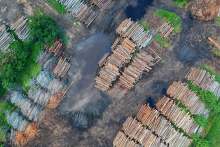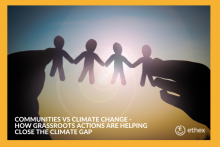As the world teeters on the edge of climate meltdown, the good news is that we have a plan to stop us falling into the abyss.
The Green New Deal is being hailed as the way to avert runaway climate change. The big idea is to kickstart a renewables revolution that will churn out everything from solar panels to electric vehicles at an unprecedented rate to usher in a new low-carbon economy.
First developed in 2007, the plan is now firmly embedded in the political mainstream, both in the UK and North America. So far, so good.
The bad news is that dissenting voices believe that the Green New Deal has two key flaws.
The first is based on the fact that economic growth is pushing up energy demand at a rate that's just too fast to be met by installing green energy.
“If we continue growing the global economy at existing rates, it will nearly triple in size by the middle of the century,” says anthropologist Jason Hickel, writing in the Guardian.
“That’s three times more production and consumption than we’re already doing – which will require nearly three times more energy. It will be difficult enough for us to decarbonise the existing global economy – virtually impossible do it three times over.”
The second issue is that the renewable revolution is dependent upon extracting rare-earth minerals and resources for electric batteries, mostly from the Global South, a process that all too often ends up exploiting workers and trashing the environment.
“A 'green new deal' in the mould of current thinking will lead to a new form of green colonialism that will continue to sacrifice the people of the Global South to maintain our broken economic model,” says Asad Rehman who heads up the global justice campaign group War on Want.
So how are we going to head off climate catastrophe whilst side-stepping these pitfalls?
Like many global justice campaigners, Rehman believes our current levels of consumption have to change as we need to dish out the world's resources more fairly whilst at the same time heading off climate meltdown:
“Ultimately we need a huge reduction in the levels of consumption in the Global North as we consume between five and ten times more than anybody in the Global South. The result is that just 20% of the world's population is responsible for 80% of carbon emissions,” says Rehman. “The rest of the world just can't live as we do.”
But how do we sell this message to people in Manchester or Middlesbrough who are used to thinking that they can have what they want, when they want it?
“At the moment when you say to people in large parts of the country who don't have anything, 'we want you change your shopping habits and have even less', then they're not going to buy it,” admits Rehman.
“We have to portray a vision of a low-carbon world that is better than we have now and say 'you'll have clean air and warm homes',” says Rehman.
For example, the answer to our future transport needs says Rehman, isn't to flood our roads with millions of resource-hungry electric cars, but instead provide free public renewable transport.
Rehman believes that as it stands, the Green New Deal is a good starting point but that there's more work to be done. Crucially, those living in the Global South need to be considered when talking about any low-carbon future which, at the moment, just isn't happening.
“The detail isn't yet sufficient or ambitious enough,” says Rehman.





